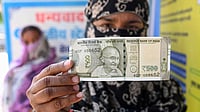Not Rs 500, India’s Poor Need At Least Rs 3,000 A Month: George Mason University Researchers
A direct cash transfer of minimum Rs 3,000 a month maybe required for the next three to four months.

India needs to increase its direct cash transfers to the poorest citizens to Rs 3,000 a month, to help them manage basic needs during a nationwide lockdown that has put millions of daily wagers out of work.
That’s according to researchers at the Mercatus Centre at George Mason University in Virginia U.S. “India’s Covid-19 stimulus and economic relief package is the smallest in the world, including among emerging economies,” Shruti Rajagopalan and Alex Tabarrok wrote in a policy brief recommending steps for India to manage the Covid-19 pandemic. “Both the Union and state governments need to announce direct cash transfers targeting a larger group.”
A 21-day nationwide lockdown announced by Prime Minister Narendra Modi left millions of Indian daily wagers out of work. It brought economic activity to a standstill and left India’s poorest facing increased risks.
India announced a Rs 1.7 lakh crore economic relief package ensuring cash transfers of Rs 500 a month, and food security. However, the package is less than one percent of the country’s GDP.
A direct cash transfer of minimum Rs 3,000 a month is required for the next three to four months to help the poorest cope with the lockdown, the researchers suggest. These transfers should be distributed through Jan Dhan accounts or mobile phone applications such as Paytm, the researchers said.
Here are the other recommendations from the Mercatus Centre at George Mason University:
- Any testing kit that has been approved in China, Japan, Singapore, South Korea, Taiwan, U.S. or Western Europe should be immediately approved in India.
- India should pledge to pay any private labs running Covid-19 tests at least the same amount as the current cost of tests being run at government labs.
- All import tariffs and quotas on medical equipment required to tackle Covid-19 should be lifted and nullified.
- Use mobile phones to survey, inform and pre-screen symptoms. The government should direct individuals with symptoms and their families to a testing center, or direct mobile testing to them.
- Keep mobile phone accounts activated even if phone bills are not paid. The government should also provide a subsidy for prepaid account holders.
- Lay claim to government schools and buildings, and rent private hotels rooms to repurpose them as quarantine facilities.
- Rapidly scale up production and distribution of masks to encourage everyone to use them.
- Use existing distribution networks to provide hand sanitisers.
- Accept voter identification cards and Aadhaar cards for in-kind transfers at ration shops.